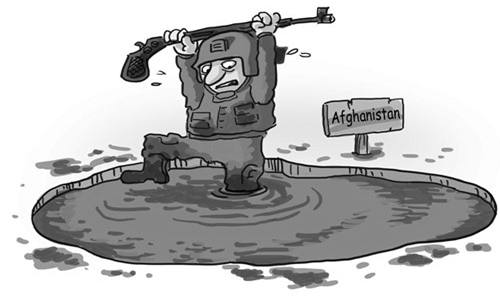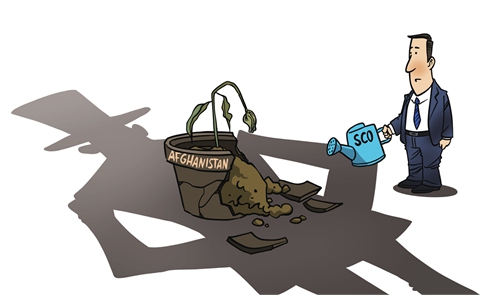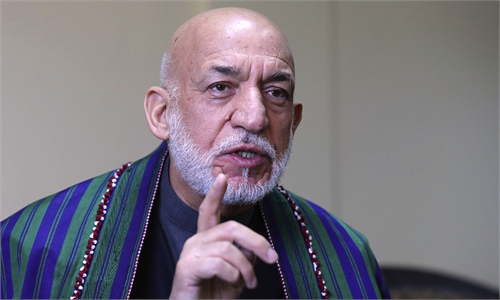
Illustration: Liu Rui/GT
The US and its allies are pulling out of Afghanistan. After the US withdraws from the region, Afghanistan will face many uncertainties. The country is very likely to fall back into war and become the headstream of regional and even global security problems. As an important neighbor of Afghanistan and a major country, China can't sit idle and keep itself out of Afghan affairs. Under such circumstances, it will be important how China makes its Afghanistan policy and plays a constructive role in Afghanistan without repeating the mistakes made by the former Soviet Union or the US.Compared with other powers, China has the ability to get involved in Afghan affairs without becoming entangled in it.
First, the geopolitical environment is different. Major powers fell into Afghanistan's "trap" by accident. The US would not interfere in the country if terrorist groups did not provoke first. Historically, Afghanistan was the main strategic channel for peoples from the north to go across the South Asian subcontinent. In modern times, Afghanistan was one of routes for Britain to go north to Central Asia, and for the Soviet Union to go south to the Indian Ocean. It later became a strategic route for the US to go north into Central Asia. But for China, Afghanistan is not such an important place in terms of geography and geopolitics.
Second, the strategic environment is different. The British Empire invaded Afghanistan mainly to consolidate the northern defense line of the Indian Empire. The Soviet Union invaded Afghanistan as a result of its strategic game with the US in Afghanistan. The US actually gave up on Afghanistan after the Cold War, and was only forced to interfere in the region after September 11 attacks. The US' own former partners have attacked its core targets. If there is no retaliation against Afghanistan, its prestige as a hegemonic power would be seriously damaged and its international position would be shaken. Afghanistan doesn't concern the US' core interests. US strategic hesitation and uncertainty there have resulted in US strategic failure in Afghanistan.
China does not have this concern. For China's own interests, Afghanistan-related issues have mostly involved minor troubles, and there is no need to pick a fight there.
Third, strategic principles are different. Be it the Britain Empire, the former Soviet Union, or the US, they all combined their ideology with foreign policies in Afghanistan, trying to occupy and rebuild Afghanistan.
China is different. China sticks to non-interference principles of diplomacy, and does not put too much emphasis on Afghanistan's regime form and values. Therefore, China can adopt a more pragmatic and flexible policy on the Afghan issue. China does not need to follow the above mentioned three big powers to make concrete Afghanistan policy goals. And it will not be mired in the country's internal affairs.
After all, the Afghan issue does not touch on China's core interests. China has two stakes in this issue. First, it relates to China's image as a major power. China has the responsibility and obligation to contribute to world peace and stability. Afghanistan is China's neighbor. If China does not participate in Afghan affairs, China can hardly establish itself as a responsible major power.
Second, non-traditional security issues such as terrorism and drug trafficking are the biggest threat to China if Afghanistan is mired in internal chaos. In the face of non-traditional security issues, the military, as the traditional security forces, is not the most effective means.
Therefore, there is no need for China to directly intervene in Afghanistan's internal affairs like other major powers did in the past. As such, we will not face difficult issues of extricating ourselves from Afghan affairs as some major powers have bitterly learned.
The author is professor at the Center for American Studies, Fudan University. opinion@globaltimes.com.cn


